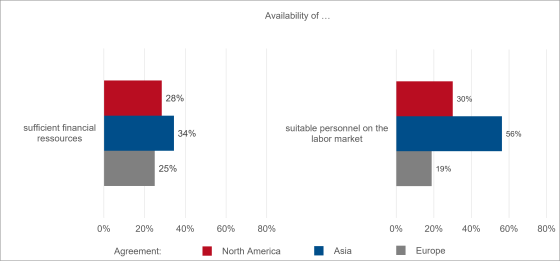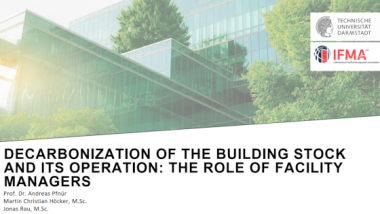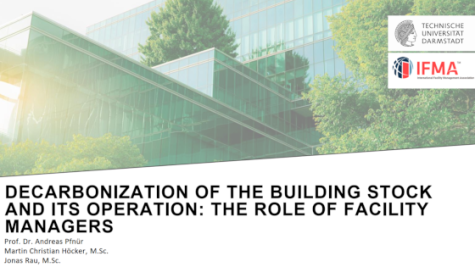FG Immobilienwirtschaft und Baubetriebswirtschaftslehre

ESG_IFMA_Start
ESG in a global comparison: the role of facility managers
The fight against and mitigation of the effects of climate change must be recognized as a major human challenge of our time. In this context, it is essential to consider the building sector and in particular the operation of buildings:
- Residential and non-residential buildings are responsible for around 40 % of the global greenhouse gas emissions. The building sector is a key factor and has to be considered when fighting climate change.
- Major importance of building operations: Up to 75% of the building sector‘s CO2 emissions are produced by building operations.
- Different ways of achieving objectives: Different hurdles, management models and regulations around the world mean that facility managers are affected in different ways globally.
Organizations and owners are called upon to rise to this challenge. Regulatory as well as social and economic pressure testify to the high relevance of the task at hand and the high expectations placed on the building sector.
Against this background, the Department of Real Estate Management and Construction Management at the Technical University of Darmstadt, together with the International Facility Management Association, conducted a joint project to investigate how the facility management sector is affected by decarbonization efforts and its role in achieving the climate targets set for the building sector.
In an online survey of over 300 responsible facility managers worldwide, the study participants were asked about
- organizations expectations regarding the decarbonization of existing buildings and building operations,
- facility managers current role with regard to decarbonization,
- the resources available for decarbonizing the building stock and operation, and
- facility managers future role in the field described.
The results provide an initial international comparison of how the facility management sector is affected and what role it plays in climate efforts in the building context.
The results provide an initial international comparison of how the facility management sector is affected and what role it plays in climate efforts in the building context.
Selected key findings of the study are:
- Decarbonization of the building stock and building operation is of great importance worldwide. Motives, degrees of fulfillment and hurdles vary greatly internationally. Europe and Asia, in particular, are much more advanced in terms of decarbonization than America
- Decarbonization targets can only be achieved with FM. Owners are dependent on FM to achieve climate targets. Above all, they lack specialist knowledge
- ESG & FM: Strategic climate protection expertise, technical know-how and proximity to buildings are seen as a great opportunity for an expanded FM profession with new business opportunities
| Name | Working area(s) | Contact | |
|---|---|---|---|

| Prof. Dr. Andreas Pfnür | pfnuer@bwl.tu-... +49 6151 16-24510 S1|02 31 | |

| Martin Christian Höcker M.Sc. Research assistant at the Department of Real Estate Management and Construction Economics | hoecker@bwl.tu-... +49 6151 16-24514 S1|02 38 | |

| Jonas Rau M.Sc. | rau@bwl.tu-... +49 6151 16-24512 S1|02 31 |








